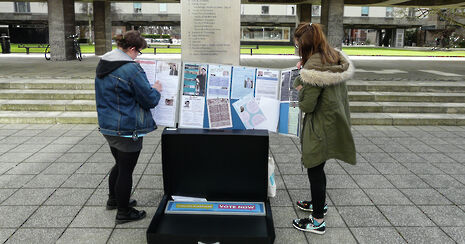CUSU faces a credibility crisis in the coming year
Our students’ union desperately needs to demonstrate it can be a force for change

If it’s not too early to nominate a word of the year for 2016, ‘disaffiliation’ is looking like a strong candidate. We approach an era-defining referendum on the United Kingdom’s membership of the European Union. Last month, the University of Cambridge voted narrowly to remain affiliated to the National Union of Students (NUS). Now, the burning gaze of student anger has settled upon a new target: CUSU.
In the immediate aftermath of the NUS vote, a group of Peterhouse students – angry at CUSU’s handling of the the NUS referendum and the shutting down of The Cambridge Student’s (TCS) print edition – wrote an open letter to their JCR demanding a referendum on affiliation with CUSU. They were followed swiftly by Queens’, whose JCR executive confirmed their intention to call a vote on CUSU membership next term. Following demands on their JCR Facebook page, it seems Clare may join them.
As Cambridge students escape into internships, holidays and home life over the long summer, tempers may cool. Nevertheless, the underlying message remains the same: there is widespread discontent among many students about how they are represented. The narrowness of the vote on NUS membership – 303 votes separated remain and leave – shows how tight things have become. For many, there is no belief that bodies like the NUS are engaged with students’ actual concerns.
This backlash was bound to affect CUSU – and, in part, for good reason. The end of TCS’s print edition was brutal, with neither side involved shrouding itself in glory. Where CUSU trampled cruelly over the hard work of student volunteers, certain TCS members – past and present – showed an alarming willingness to drag individuals into the mud with shameful personal attacks.
The whole fiasco could have been mitigated if CUSU had taken a more honest approach to democratic debate earlier this year. During the build up to the referendum to create a Disabled Students’ Officer as a full-time sabbatical position, I was astounded by the unwillingness of CUSU to be open about what the long-term cost of the position could be. Several people within CUSU, who expressed their concerns about the role to me privately, refused to speak out about the financial consequences which the role would entail. It must surely have been known at the time of the referendum that TCS could end up on the chopping block.
In the National Student Survey 2015, CUSU was rated, by outgoing finalists, as the the worst university student union in the country. Only 32 per cent of survey respondents were satisfied with it, a five per cent drop on the year before. It will be very interesting to see the assessment of this year’s graduates.
In taking on leadership of this institution, Amatey Doku and his team face an immense challenge. CUSU’s accounts show an increase of nearly £50,000 in staff fees, despite only one more staff member being hired. With the abolishment of the Coordinator role, it appears that its responsibilities will be distributed among staff members. This reflects a general shift in the role of sabbatical officers – where, in the past, administration of CUSU was chiefly fulfilled by sabbs, it seems there is an increasing drive for these duties to be handled by fully paid staff.
This should, theoretically, free up officers to focus on campaigning. In this environment, a failure to effect actual change will be less forgivable. With the best intentions, CUSU have this year been continuously sluggish in responding to student concerns.
Late last year, they struggled to grasp how best to oppose proposed street lighting cuts, bizarrely opening their own poll rather than backing an already successful one. CUSU Council resolved on 15th February (in an emergency motion proposed by the sabbs themselves) to write a letter to the British and Italian ambassadors to Egypt calling for a full investigation into the death of Girton student Giulio Regeni, but it took until the 6th April for a letter to actually be sent. This slow-footedness reared its head again during the NUS referendum. After the Council mandated the sabbs to write a letter to NUS condemning anti-Semitism, the actual writing of the letter had to be outsourced to out campaigner Adam Crafton – this type of behaviour will become less and less forgivable if administrative burdens are taken off sabbs’ shoulders.
CUSU Council engagement has gradually increased this year, and this presents an opportunity for the new sabbs to re-capture the attention of the student body. If the new team can prove they can effectively campaign for change, and have the competent administrative backing of a staff team, they can then make a convincing argument for colleges to remain affiliated. If change continues to occur in spite of CUSU, rather than because of it, students may well decide their membership fees are better in the pockets of their own JCRs.
 News / Uni redundancy consultation ‘falls short of legal duties’, unions say6 December 2025
News / Uni redundancy consultation ‘falls short of legal duties’, unions say6 December 2025 News / Cambridge students accused of ‘gleeful’ racist hate crime4 December 2025
News / Cambridge students accused of ‘gleeful’ racist hate crime4 December 2025 News / Researchers find five stages of brain development5 December 2025
News / Researchers find five stages of brain development5 December 2025 Music / The trials and tribulations of indie collabs 6 December 2025
Music / The trials and tribulations of indie collabs 6 December 2025 News / Cambridge cosies up to Reform UK30 November 2025
News / Cambridge cosies up to Reform UK30 November 2025









